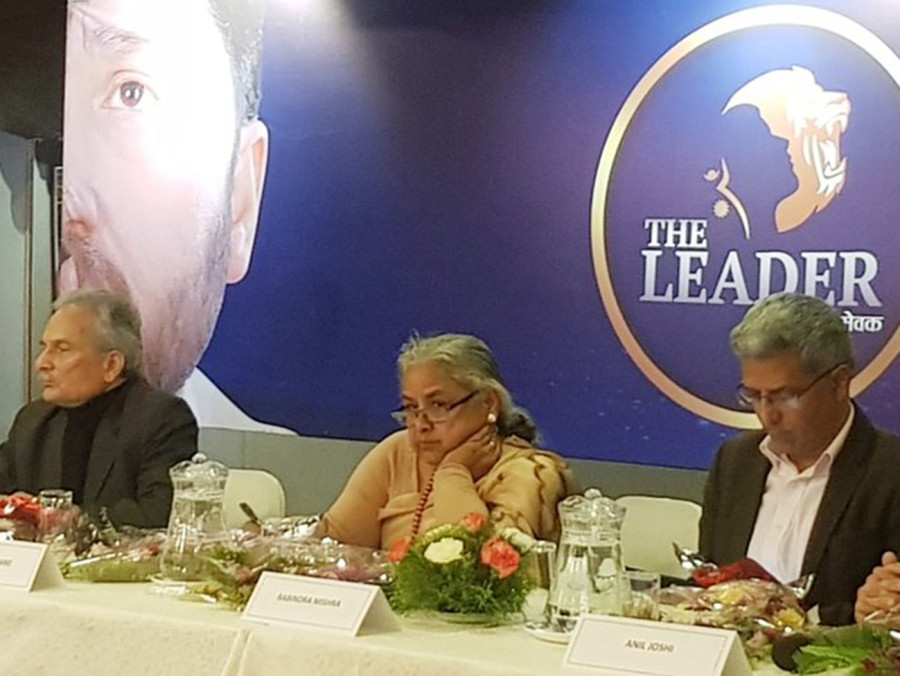National
So you think you can govern?
A new game show wants to find the next exceptional political leader. But not everyone is convinced.
Shashwat Pant
In 2001, every Saturday after the 8pm news, a sombre Madan Krishna Shrestha would appear on Nepal Television as host of the network’s new game show. Modelled after the US show Who Wants to be a Millionaire, Nagad Panch Lakh offered contestants a chance to win Rs 500,000. As one of Nepal’s first game shows, it did quite well, even though it was cancelled soon enough, after the show failed to pay winning contestants.
Since Nagad Panch Lakh, game shows have become increasingly more popular—and successful. After the success of shows like Nepal Idol and Himalaya Roadies, both of which are local iterations of successful international franchises, there is now a new show in the making—except this one attempts to crown a different kind of winner: a political leader.
At a press conference last week, News24 and SRBN Media announced their show, aptly named ‘The Leader’, which will find the “leader they [Nepalis] have been looking for”. The show, which will be judged by former prime minister Baburam Bhattarai, former chief justice Sushila Karki and Sajha Party coordinator Rabindra Mishra, will be hosted by television personality Rabi Lamichhane on News24, according to Bipin Acharya, chairman of SRBN Media, which is producing the show. Two more judges will soon be announced, said Acharya.
Ever since the announcement, the show has drawn widespread criticism for its premise of finding a political leader through a game show.
Political analyst Shyam Shrestha said he was quite shocked to hear that such a show was even happening.
“A leader is someone who can help the country rise up through tough times. If television shows could create leaders, the world would be full of them,” said Shrestha. “I don't understand why we are trying this.”
Shrestha also expressed surprise at the roster of judges.
“The fact that Baburam Bhattarai and Sushila Karki have decided to join the show is shocking. These are serious people who have done notable work in politics. Why they have joined is beyond me,” he said.
Acharya, however, said that the judges were chosen because of their stature and experience in politics.
“These people are here based on merit. They have all been capable leaders in their own right and their inputs will be key to finding a winner,” said Acharya.
The show, according to SRBN Media, will have 30 to 35 episodes. A call for interested applicants has already begun, with anyone over the age of 18 and without a criminal record eligible to take part by paying a fee of Rs 1,000. The show organisers say that they will visit all seven provinces to hold auditions for candidates. The show will ultimately take place in Kathmandu.
On the show, contestants will have to go through various challenges. According to the organisers, they will be put through rigorous tests which will include public speaking, debating and discussions on various laws and policies.
The winner will get Rs 2 million cash, a car, an apartment and a “chance to join national politics”.
This, however, isn’t the first time that a show like this has been proposed. A similar show had aired on Kantipur Television nine years ago, called ‘Khoj Yuwa Netritwa ko’—‘Search for a young leader’. The judges on that show were journalist Yubaraj Ghimire, constitutional expert Bhimarjun Acharya and current Supreme Court Justice Sapana Pradhan-Malla. The show, however, collapsed after controversies over vote manipulation led the primary sponsor, Chemonics International, to pull out, according to Mysansar, a blog.
Acharya of SRBN Media believes that his show will succeed where the older show failed, and he’s counting on the popularity of his host, Lamichhane, to ensure its success.
“We both wanted to do something together and after brainstorming for around six months, we came up with the idea for this reality show,” said Acharya.
Lamichhane’s participation was the reason that they decided to push ahead with the show, said Acharya.
The Post’s attempts to reach Lamichhane for comment via phone and text message were unsuccessful.
Mishra, the journalist-turned-politician, said that he was joining the show because it was a new concept and it could ultimately help Nepali politics.
“I know there is no guarantee that we will find a leader but I felt this was a good experiment to be a part of,” Mishra told the Post. “I know people have belittled me personally saying that I joined this show because I failed as a political leader but that isn’t the case. I feel this show is a good opportunity for Nepali politics.”
There is also support on social media for the show and its concept on the grounds that it could be a platform for young people to get into politics.
“Whether or not reality shows produce leaders or not only time will tell. But we should at least be a part of this debate. If the show is successful, it will show the younger generation what a leader should be like. The manner in which the youth sees politics and politicians can change,” said one user on Twitter.
A political game show might be a novel concept but there have been political leaders who’ve been part of reality and game shows. Most notably, US President Donald Trump, who was impeached by the US Congress on Wednesday, hosted the game show, The Apprentice.
According to the Sajha Party, which has cast itself as an ‘alternative’ political force in the country, the show will interrogate the idea of who can be a leader.
“It’s not clear if a leader can be created via reality shows. However, I think it can create people who can become future leaders. The way the newer generation will elect a leader may be different. How will that happen may be a question. But, the whole idea that leaders are created only through revolution, protest and jail isn’t quite right,” Surya Raj Acharya, spokesperson for the Sajha Party, wrote on Twitter.
But not everyone is buying this argument. Most, in fact, have made fun of the show on social media, questioning its very rationale.
“Are they looking for a political leader, an entrepreneurial leader or a social leader? That needs to be clarified,” said Geja Sharma Wagle, security and political analyst. “I personally feel that leaders cannot be made through TV shows, especially here in Nepal where most of those active in politics have emerged through a proper system.”




 14.24°C Kathmandu
14.24°C Kathmandu















